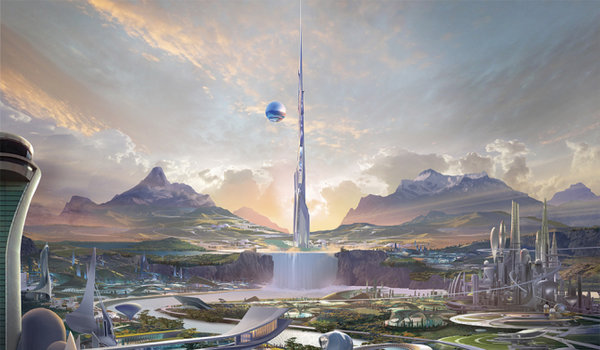Fifty years ago, the future looked bright, shiny, and positive. We would all have flying cars, jetpacks, a colony on the moon, and robots to help around the house. Somewhere along the way, that idealistic view of the future disappeared and now looks bleaker with each passing year. Most sci-fi films nowadays seem to support this bleak future, but there is always a chance to make a better future like the one we imagined. That is what Tomorrowland tries to convey. Produced by Disney, directed by Brad Bird, and co-written by Damon Lindelof, Tomorrowland is a good movie with interesting, eye-opening themes, but like the future, it seemed to be lost on audiences. Let’s take a second look and figure out why no one embraced it.
The film is a mixture of the Disneyland themed futuristic/sci-fi land “Tomorrowland” and Walt Disney’s unrealised ultimate dream Epcot (an experimental independent city state-turned-theme park), and reflects Mr. Disney’s futurism and push for progress and creative innovation. Brad Bird does his best to replicate this mindset, bringing forth his own sense of wonder and space-age awe also seen in The Iron Giant and The Incredibles. In the movie, Tomorrowland is a cityscape in another dimension where scientists, artists, and great thinkers can pursue any technological or creative project they desire without financial barriers. So, every major scientist, thinker, philosopher, futurist, and the like that has lived from the 1880s to say the 1960s were likely part of Tomorrowland, and the recruitment group Plus Ultra.
The film has an intriguing marketing scheme, with a viral alternate-reality game called “The Optimist”, exploring Disney’s enigmatic fictional connection to Plus Ultra and having actual guests visit Disneyland where clues and prizes were placed. Very creative. And the teaser trailer just blew me away, giving us little clues to the story through the visuals rather than slamming as much footage as possible into our faces and giving the whole film away – I’m looking at you Batman v Superman.
Tomorrowland has good ideas but has a shaky plot. People often point the finger at Lindelof for his “set up good plots with poor payoffs” gimmick, and I can agree to an extent. The film doesn’t really reveal much about the secret world to the audience. Two out of three of the film’s protagonists both have extensive histories with the city, and they do not dish out the info viewers might be interested in. The marketing had a deep mythos to it, but unfortunately, very little backstory is told to the audience during the picture, so when it comes to exposition, the characters either conk out or get interrupted just when it gets interesting.
Anyway to the story itself. Our heroine is Casey Newton (Britt Robertson), an optimistic teenage tearaway living in Florida whose dad worked as a NASA engineer until the space program got axed and the iconic rocket launch site at Cape Canaveral is to be demolished. Casey, wishing to preserve both the past and the future, tries to sabotage the demolition but is arrested. She finds a strange pin in her possessions, and when she touches it, she is transported to Tomorrowland, which she tries to track down. She meets a little girl named Athena (Raffey Cassidy) who gave her the pin, who guides her to meet Frank Walker (George Clooney), a former member of Tomorrowland who was exiled and is now a bitter pessimist with a trouble friendship with Athena. Together they decide to return to Tomorrowland and prevent an approaching disaster that could destroy the world.
We don’t really get to see much of Tomorrowland during the film, but the set design is just amazing. Casey spends a full five minutes wandering through the city, in a breathtaking single shot, with all kinds of creative tech on display, some which exist in some capacity today. There are lots of fun, very dazzling, Disney-style moments that really captured my imagination as an optimist.
The chemistry between Robertson, Clooney, and Cassidy carries a lot of the film, and the frequent road trips scenes are improved by their interactions and dialogue. Though, the lack of discussion about the plot and deliberate vagueness is a pain. The film offers a lot of eye-opening ideas and messages about making a better future, and this is where the audience negativity comes from. The film’s designated villain David Nix (Hugh Laurie) delivers a particularly blunt speech about how Earth is being screwed over and how humanity is too lazy to make a better future. A lot of people wrote this film off as being too patronising, liberal, or in-your-face with its messages. I disagree. This film was very honest and make me think a lot about our world and what we are doing with our potential. It’s a mixed bag.
Tomorrowland is a good movie and offers the idea of a good future like we imagined back in the 1960s, and it makes us believe that it is possible to obtain such a future through hardwork, optimism, and imagination. Hugh Laurie points out that humanity embraced the idea of the apocalypse through fiction, and the character is correct. One of the most popular films of 2015 was Mad Max: Fury Road, which is set in a post-apocalyptic wasteland, while Tomorrowland crashed and burnt (though Fury Road is a fantastic film about feminism and crazy cars). In fact, a lot of beloved sci-fi movies have apocalyptic bad futures like Blade Runner, Total Recall, and even Star Wars to an extent. Give me some more bright happy futures for once. Maybe we can make it happen. After all, as the Disneyland song goes – there’s a great big beautiful tomorrow just a dream away.
What are your opinions on Tomorrowland? A good film or too preachy? Should there be more movies with optimistic futures? Sound off below or leave a comment on our Twitter feed.


